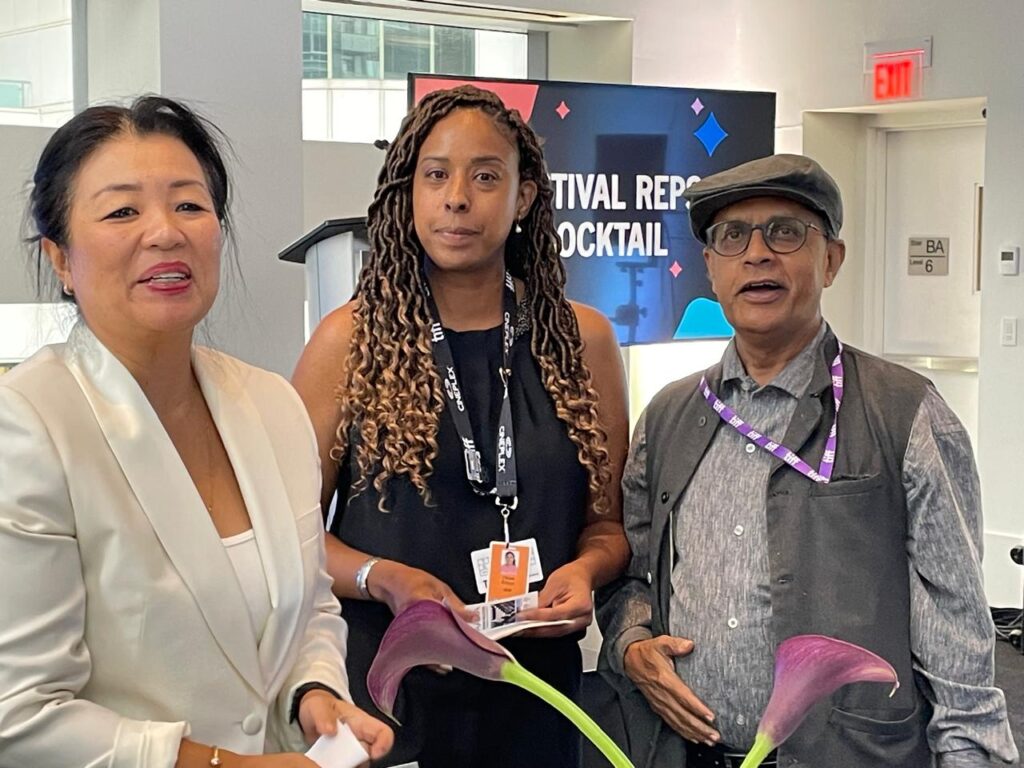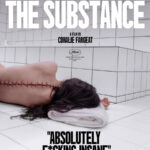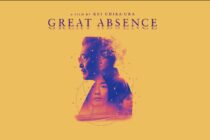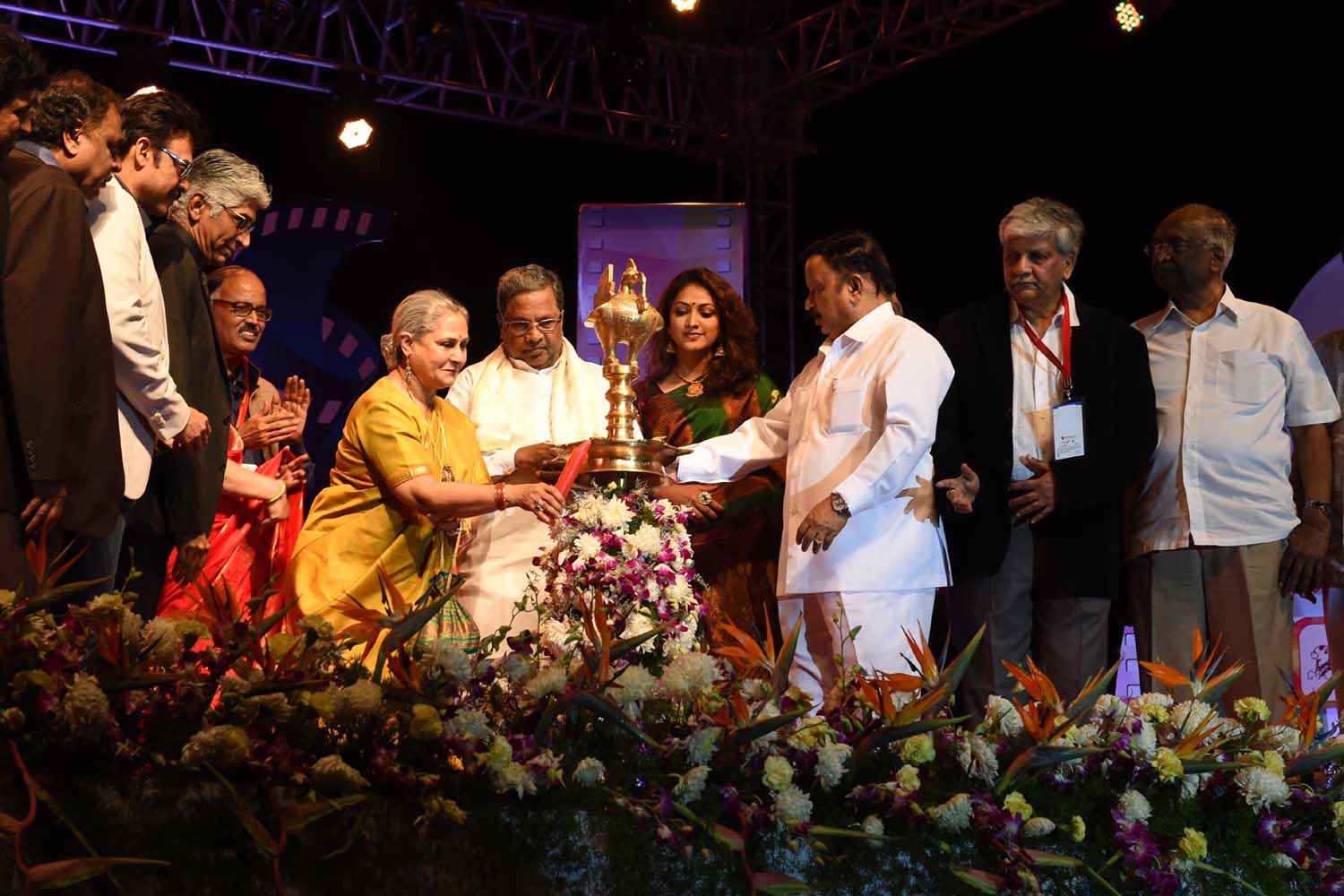True to its stated vision “presenting the best of international and Canadian cinema”the 49th Edition of Toronto International Festival lived up to it in glorious style “creating transformational experiences for film lovers and creators of all ages and backgrounds.”
Being Canada’s premier Centropolis of Cinema, TIFF, housed at its permanent residency Lightbox, and its elite team ensured that “the festival’s programming not only reflected its mission”but also unspooled tableau of choicest auteur cinemas that sought to “transform the way people see the world through films”TIFF’s fantastical tagline.
The TIFF team’s rich curatorial experience, sense of cinemas and ideation of the various sections with the choicest of cinemas, was in full flow, giving truism to the fact that “we will defend artistic excellence and artistic freedom” even in the wake of protests that shook up this year’s TIFF.
Yes, protests and demonstrations, almost right through the festival’s run, around its venues, and sometimes even in screening theatres, not withstanding, TIFF turned out to be a smooth and professionally run affair as always.
This, despite the fact that, there were teething issues with its booking app provider Ticketmaster, which became a bit of a dampener.That, however, did not ruin the enthusiasm of every cineaste to come calling drawn by the power of cinema to savour the crème la crema of films that were featured at the prestigious annual cinema jamboree.
TIFF may come tenth in the scroll of major film festivals that mark the beginning of the festival circuits across the globe right through year. After big ticket film festivals like Palm Springs, Rotterdam, Berlinale, Luxembourg, Hong Kong, Istanbul, Cannes, Karlovy Vary, Locarno and Venice, that play out before TIFF takes floor, followed by San Sebastian, Busan, Montreal, Singapore, to name a few.
However, led by the dynamic and affable CEO Cameroon Bailey, who also wields the baton of TIFF Gala Presentations, and his equally effervescent and efficient comrade in arm Chief Programming Officer Anita Lee, and score of enterprising ensemble of experienced programming and curating team, TIFF rolled out fantabulous films that coveted every true blue cinephiles who had congregated to catch them, up, close, and personal.
Having already marked attendance at Cannes and Karlovy Vary, TIFF was an altogether novel experience having been a Juror earlier. Having shortlisted about 40 films to watch, those that I was able to catch up among these, plus few others, did not disappoint at all. On the other hand, they were really surprising ensemble making my eager and enthusiastic trip to Toronto that much worth the while and wallet.
The films, which finally won the awards, in various categories bespeaking of the quality of films that lit up the show. Not that those that did not make it to the wire were any inferior.
I begin with the Best Canadian Feature Award winner Shepherds by Sophie Deraspe. The second is Taiwanese film maker Sylvia Chang’s Daughter’s Daughter which received the Honorable Mention in the Platform Competition, revolves round woman forced to decide the fate of her recently deceased daughter’s embryo.
The film turns into a searing and searching character study that sheds light on what it means to pursue independence as an older woman and questions parental responsibility.
The Substance by Coralie Fargeat which picked the People’s Choice Award along with the first runner-up Emilia Pérez by Jacques Audiard and second runner-up Anora by Sean Baker.
Rightfully so, the coveted FIPRESCI award recognizing emerging filmmakers and a debut feature film having its World Premiere in TIFF’s Discovery programme, went to Somalian beauty Mother Mother by K’naan Warsame.
As FIPRESCI Jury succinctly justified their pick “Mother Mothernot only depicts a humanistic approach towards a revenge narrative set in a country haunted by violence and grief, but is remarkable in its treatment of contentious politics through its parallels of human and natural world. The debut feature through its compelling formal attributes and charismatic acting, conveys a sense of hope and healing after tragedy.”
That said and dusted, among the impressive pick of films that embellished this year’s TIFF were 40 Acres, the Canadian feature, directed by RT Thorne, about Black and Indigenous people defending their land from those who would kill them for it without a second thought.
Then came Aberdeen, another Canadian flick by director duo Ryan Cooper, Eva Thomas with a bravura performance by Gail Maurice playing the titular role of a homeless matriarch, who, rising above her own turbulent and tumultuous life braves on fighting for the stability of her grandkids, to save them, as also her own self, from social opprobrium.
Then of course, you had director Marcelle Lunam’s debutant feature Addition, coveting you with the trials and tribulations of a mathematician coming to terms with her compulsive counting habit (and imaginary friendship with Nikola Tesla) as she bonds in a budding romance in the charming adaptation of Toni Jordan’s novel.
Anywhere Anytime, debut Italian fare by Milad Tangshir, about an immigrant food delivery man whose world comes crashing down when, during a drop-off, the bicycle he has just spent all his money on is stolen, is reminiscent of Italian great Vittorio De Sica’s 1948 classic Bicycle Thieves, showing a promising director on the horizon.
Georgian film April by Dea Kulumbegashvili, her second feature speaks of a true tale of an obstetrician-gynecologist who undertakes clandestine illegal abortions for desperate women on her own time. Forcefully told, April is aedgy tour de force film.
Beloved Tropic, Spanish film by Ana Endara, about an immigrant caretaker and well-to-do matriarch is a wonderful study of a relationship between two seemingly disparate women. How the two form a symbiotic bond as the caretaker reaches out to her caregiver, who is isolated from the world by a dark secret, makes for engrossing film.
Bird by Canada’s Andrea Arnoldabout a distracted father and his lonely and imaginative 12-year-old daughter, with a bit of magic realism thrown in turns out an interesting and engaging ode to the wondrous transition from childhood to adolescence.
Israeli film Blissby Shemi Zarhin is a cheeky look at an aged difference couple confronting painful truths in this insightful, observational drama.
Boong by Manipuri’s Lakshmipriya Devi, presents a poignant portrayal of childhood resilience following a schoolboy, as he defies borders and ethno-racial discord in Manipur to reunite his estranged family.
By The Stream by South Korea’s Hong Sang-soo presents a bittersweet tale of loneliness, connection, and artistic creation as solace. The minimalist film explores the ineffable and complex nature of human bonds against a beautiful autumnal landscape of changing leaves, touching upon existential questions about life’s overwhelming nature, be it family strife, mental health challenges, or the elusiveness of love.
Crocodile Tears, from Indonesia, by debutant filmmaker Tumpal Tampubolon, is a thriller about a young man and his overbearing mother in their isolated crocodile farm, whose lives are upended upside with the arrival of a young woman.The film explores the emotional complexities between mothers and sons, especially with authoritarian parenting.
Noted filmmaker Mati Diop’s docu-drama Dahomey which won the Golden Bear winner at the Berlinale, traces the historic repatriation of 26 royal treasures from France to Benin, simultaneously forging a speculative and political reflection on cultural heritage, collective memory, and the implications of restitution.
The Vietnamese flick Don’t Cry, Butterfly by Dương Dieu Linh spotlights on a woman who, despite learning of her husband’s infidelity, believes that mystical means can rid him of the problem rather than confront, expose and shame him, in this searing study the role of gender and cultural traditions in Vietnam.
Turkish film Edge of Night by Türker Süer revolves around two brothers who have grown apart over years, yet carry a heavy burden of guilt related to the part each played in the death of their father.
Canada’s Jacques Audiard’s musical drama Emilia Pérezus a heady amalgam of pop opera, narcotics thriller, and gender affirmation captivating and exhilarating drama, turning out a rollercoaster crime caper which saw Karla Sofía Gascónreceive Best Actress Award at Cannes Film Festival for her bravura performance.
The animation feature Flow from Latvia by Gints Zilbalodis, sees a cat, a dog, a lemur, a secretary bird, and a capybara, thrown together and fighting for survival as ever-rising waters threaten their animal forest world trying to find common ground if they hope to survive an unforgettable journey.
Gülizar by Belkıs Bayrak from Turkey speaks of a 22-year-old bride-to-be, who surviving a violent physical assault on her journey from Turkey to Kosovo where she envisioned a fresh start, from her strict Turkish home full of taboos and expectations for women and men alike.
Told through the gaze of a woman, Gülizar delves into the complexities of trauma, societal expectations, and the universal search for self-discovery and determinations.
Harvest by UK’s Athina Rachel Tsangariset in a remote English village where traditional ways of life are brutally disrupted by private interests, is a haunting allegory about xenophobic anxiety and unchecked capitalism.
Julie Keeps Quiet, Belgium fare from Leonardo van Dijl under sketches an empathetic portrait of a talented teenager coming to grips with trauma and rediscovering her connections to the people in her world.
Measures for a Funeral Picture of Maple Leaf by Canada’s Sofia Bohdanowiczpieces together the extraordinary story of real-life early 20th-century Canadian violinist Kathleen Parlow.
My Fathers’ Daughter by Egil Pedersen from Norway is a delightful debut film that follows the wistful teenaged as she discovers the truth about her father’s identity.
On Becoming a Guinea Fowl by Zambian Welsh writer-director Rungano Nyoni turns out a surrealist drama about the secrets families keep.
Quisling – The Final Days by Erik Poppespeaks of the Second World War’s most infamous traitors.
Seven Days by Iran’s Ali Samadi Ahadiexplores the struggle of imprisoned human rights activist Maryam as she wages a relentless battle for equality and democracy and captures the personal costs of struggle for human rights.
Shepherdsby Sophie Deraspe, Souleymane’s Storyby Boris Lojkinem, The Brutalistby Brady Corbet, by Belén Funes,The Girl with the Needleby Denmark’s Magnus von Horn, The Room Next Doorby Spain’s renowned Pedro Almodóvar, The Seed of the Sacred Figby Iran’s Mohammad Rasoulof, The Shroudsby David Cronenberg, The Substanceby Coralie Fargeat,The Village Next to Paradiseby Somalia’s Mo Harawe, The Wolves Always Come at Nightby Mongolia’s Gabrielle Bradyare among the impressive set of films that lit up the 49th Edition of Toronto International Film Festival.
Indeed, the 11 days one spent at the 49th Toronto International Film Festival provided for some cinematic magic, magical moments, and everlasting memories of contemporary cinemas that have been gracing the world movie marquee.
by

S VISWANATH is a veteran film critic who officiates as JURY at several National & International Film Festivals. He deputises as CHIEF CINEMA CURATOR/PROGRAMMER & CREATIVE ADVISOR for Bengaluru International Film Festival (BIFFes). He also curates & advises on the selection of shorts & documentaries for Bengaluru International Short Film Festival (BISFF). Mr Viswanath is the author of “RANDOM REFLECTIONS: A Kaleidoscopic Musings on Kannada Cinema”.



































Leave a Reply